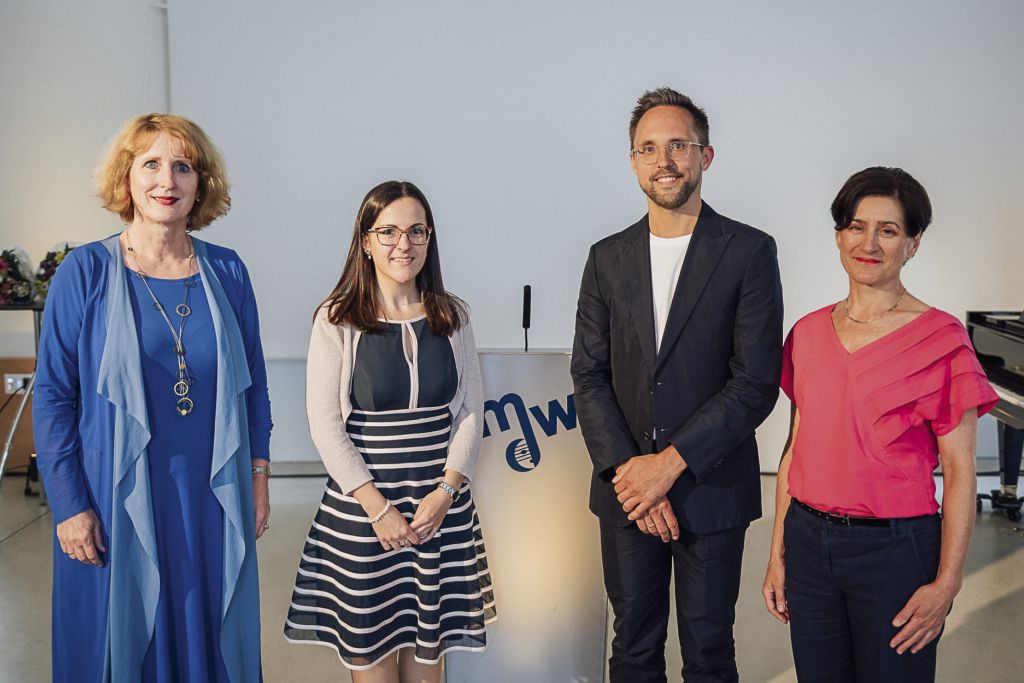On 8 June 2022, the Herta and Kurt Blaukopf Award for outstanding mdw dissertations was conferred for the second time. This award, worth € 2,000 per awardee, went to four excellent early-stage researchers. The dissertations thus recognised demonstrate the broad spectrum of research currently being pursued at the mdw and once again bear witness to the quality of the findings being produced by our University’s doctoral candidates.
Krista de Wit (Department of Music Education Research, Music Didactics and Elementary Music Education) was recognised for her dissertation entitled Legacy. Participatory Music Practices with Elderly People as a Resource for the Well-being of Healthcare Professionals. In her video address, De Wit—who now pursues research on the topic of music and healthcare at Hanze University of Applied Sciences in Groningen, the Netherlands—made an appeal for music and professional musicians to be accorded a central role in positive social change in the healthcare sector. Being recognised with the Blaukopf Award, she stated, reinforced her intention to continue researching and promoting “compassionate healthcare” via the employment of live music and music-making together in this setting.
How can music therapy contribute to the reduction of social inequality? Julia Fent (Department of Music Therapy and Department of Cultural Management and Gender Studies) took up this question in her dissertation Diskriminierungskritische Perspektiven auf Musiktherapie und ihre Kontexte [Anti-discriminatory Perspectives on Music Therapy and their Contexts]. In her statement, she ascertained that she experiences the mdw as a university where anti-discriminatory efforts are not viewed as an annoying obligation but instead enjoy broad-based support. Critical reflection, she said, is challenging but indispensable to music therapy’s aspiration to do justice to all individuals with whom music therapists work in their everyday practice. Fent is currently continuing her academic career as a researcher employed in two mdw-based research projects.
Montserrat Pàmies-Vilà (Department of Music Acoustics – Wiener Klangstil), in her dissertation Expressive Performance on Single-Reed Woodwind Instruments. An Experimental Characterisation of Articulatory Actions, examined players’ influence on the acoustic behaviour of woodwind instruments—in particular the clarinet and saxophone—and also employed an “artificial blowing machine” in her experiments for purposes of comparison. Pàmies-Vilà, whose work has already been honoured elsewhere, is likewise continuing her research pursuits and currently experimenting with string instruments played by a robot arm as part of her work as a postdoctoral researcher at the mdw with funding from the FWF’s Herta Firnberg programme.
Axel Petri-Preis (Department of Music Education Research, Music Didactics and Elementary Music Education) posed the question as to how musicians acquire knowledge about practices of audience and community engagement (as denoted by the German-language term Musikvermittlung). In his dissertation Musikvermittlung lernen. Eine Analyse von Lernwegen klassischer Musiker_innen [Learning Musikvermittlung. An Analysis of Classical Musicians’ Learning Trajectories], which has already been released as an independent publication, his observations of individual learning trajectories lead him to conclude that knowledge in the field of Musikvermittlung is for the most part generated in informal settings; on this basis, he then goes on to propose didactic concepts. Petri-Preis researches and teaches at the mdw’s Department of Music Education Research, Music Didactics and Elementary Music Education (IMP).

The awards ceremony once again took place in the presence of the descendants of Herta and Kurt Blaukopf, after whom this award is named in recognition of the innovative and interdisciplinary research that they pursued. Following introductory words by Rector Ulrike Sych, Office of Research Support head Therese Kaufmann, mdw Dean of Research Programmes Nikolaus Urbanek, and Department of Music Sociology (IMS) head Rosa Reitsamer, Sarah Chaker and Raphaela Viehböck of the IMS provided a glimpse into their ongoing research on the Blaukopfs’ life and work.
Magdalena Hallste (soprano) and Elitsa Desseva (piano) interpreted the song cycle Die stille Stadt by Alma Mahler-Werfel, which Herta Blaukopf edited for publication, and a further musical accent was provided by Duo Stump-Linshalm with UISGE BEATHA [ɯʃkʲe ‘bɛha] – A Guide to Flavours for contrabass clarinet.
Even if two of the awardees were only able to attend virtually, this ceremony—which, happily, it was once again possible to realise as a physically present event—was a highlight of the mdw’s academic calendar!
Didn’t catch the awards ceremony? mediathek.mdw.ac.at/blaukopf-award2022

